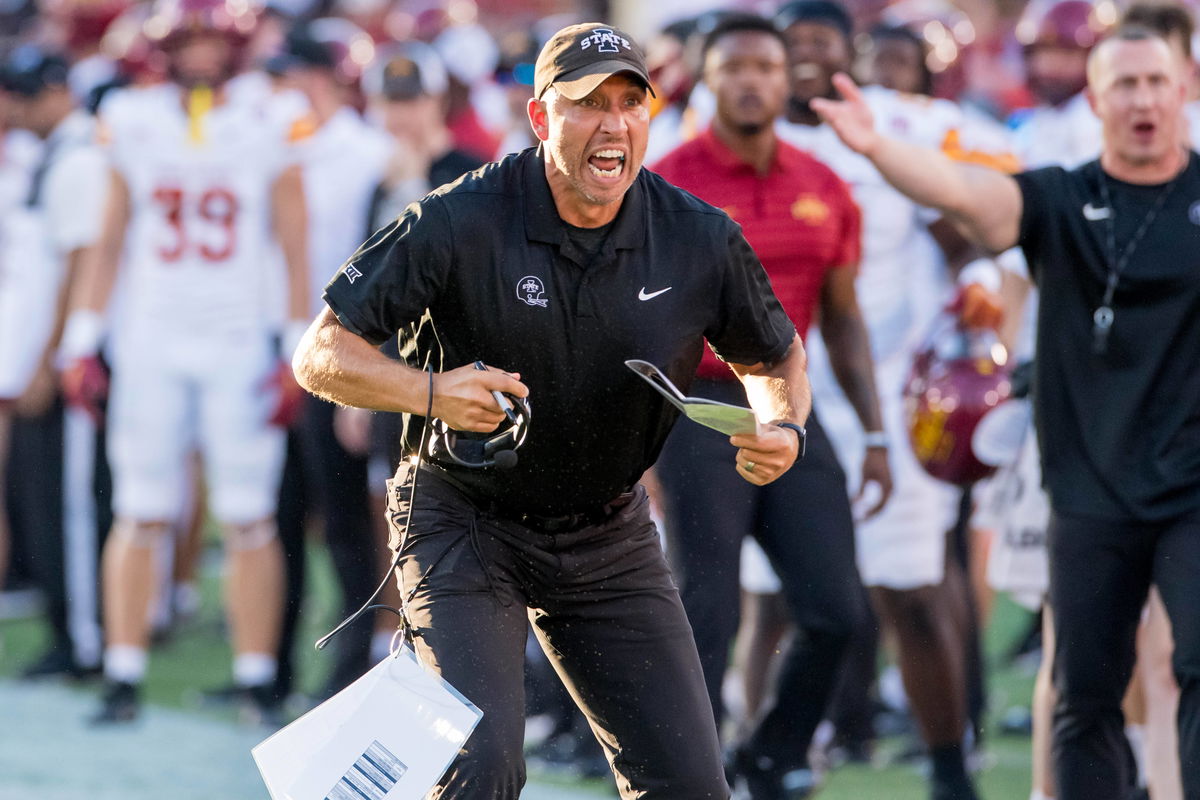
Imago
Source: Imago

Imago
Source: Imago
You know those moments in sports where you think, ‘Wow, this could be huge’? But then you squint a little closer and go, ‘Wait… is this actually a trap door disguised as a trophy case?’ Yes. That’s the vibe swirling around Ames, Iowa, right now. Matt Campbell just led Iowa State to the greatest season in school history—11 wins, Big 12 title appearance, and a team that finally stopped letting the Power 5 party laugh them out. But then came July 1st, and Iowa State made a bold NIL move that might just end up poking holes in that victory balloon.
Watch What’s Trending Now!
Here’s the play: Iowa State is going all-in on equal revenue sharing. That means every single student-athlete at the university gets a cut of the $20.5 million pool allowed under the new House v. NCAA settlement. Sounds cool, right? Equitable. Ethical. Everyone eats (yes, including Iowa State’s Olympic sports). But here’s the catch—they’re likely the only Big 12 school doing it this way. And in a sport where five-stars chase six-figure payouts, that might be a brutal recruiting pitch for a program trying to stay elite.
Cyclone AD Jamie Pollard explained the philosophy like this: “We just felt like that is part of our culture.” On July 2, Iowa State insider Nick Marovets hopped onto ‘Locked In on Cyclones,’ started off with the quote: “So, this I’m going to keep really—as far as quote-unquote article reading… ‘every single Iowa State athlete will receive a payment through player revenue sharing.'”
ADVERTISEMENT
View this post on Instagram
Nick Marovets doubled down on that vision, saying, “My initial response was, ‘Let’s go. All right, now we’re talking. This is awesome…. This is unique to Iowa State… This is something that Iowa State can use as far as like a recruiting pitch down the road, yada yada yada.’ Then I started looking a little bit more into the public perception of this, and I was shocked to see a lot of people had a more negative stance on it. I can see both sides of the coin. The negative stance being that obviously football and basketball players aren’t going to be paid as much relative to what they would get if it were paid out differently. I really can understand that point.” Look, the move is pure Iowa State.
This is the program that built its name on grit, loyalty, and development. It’s never been the flashiest brand, but it’s always punched above its weight class. But in the NIL era, punching up might not be enough. When a four-star linebacker gets $250K to go ride pine at Texas A&M, how do you convince him to come to Ames for a fraction of that?
ADVERTISEMENT
And that’s the bittersweet dilemma for Matt Campbell. On one hand, his team’s unity, culture, and all-in attitude are a huge reason why they got to 11 wins last year. No ego wars. No NIL locker room drama. Everyone rowing the same boat. But here’s the flip side: culture don’t always win championships when you’re facing teams stacked with NFL talent brought in by deep-pocketed collectives. It’s not a level playing field. Not anymore. Football and men’s basketball are the sports which generate the most revenue, the rest generate but significantly low.
Now, Jamie Pollard isn’t just writing checks—he’s betting the house on a philosophy. Nick Marovets laid it out bluntly: “I think it’s kind of undetermined at this point, but there’s one of two things that can happen: Either Iowa State flourishes and we start to see success across the board, more revenue, more growth… or it completely burns Iowa State. And there’s absolutely no positives, nobody wants to come play for Iowa State because they’re getting a smaller percentage of an already small payday compared to other schools.”
ADVERTISEMENT
Top Stories
Drake Maye Reveals Shoulder Injury Update as Patriots QB Announces News On Super Bowl Availability

NFL Sends Muted Warning to Bad Bunny Before Super Bowl Halftime Performance Amid ICE Controversy

PGA Tour Split Into Two as Scottie Scheffler Confirms Stance on Patrick Reed’s Return

Travis Kelce Makes Sporting Return as Teammate Gives Update on Chiefs TE’s Retirement

Tempers Boil Over as Punches Fly in Winthrop vs High Point WBB Game

Jaxson Hayes vs Mascot: Everything You Need to Know About the Entire Episode of Altercation, Suspension and More

The impact on recruiting is the real wildcard. Football and men’s basketball athletes naturally expect to get the lion’s share. But under this model? Nope. Everyone gets a slice, not just the big dogs. The concern: Will this flatten the talent ceiling in Ames? Or, weird twist—could it actually attract players who want to be part of a no-drama, everyone-eats family? It’s a gamble. But maybe it’s the only hand Iowa State could play. Let’s be real, the Cyclones aren’t outbidding Longhorns or Oregon in this arms race. But they can say, ‘Hey, you matter here. Even if you’re the backup on the tennis team, we’re breaking bread with you.’ That’s powerful. It’s also risky.
Risk worth taking for Matt Campbell’s squad?
Nick Marovets gave a perfect analogy for those who are backing this move: “So all of that to say, the ultimate takeaway here is Iowa State is being innovative. That’s the way I perceive this. This isn’t something that’s normal… to make that next step, you kinda have to be not normal. If you just follow the herd, you’re only going to the results that the herd gets. It’s kind of a risk-reward ratio, kind of like a ‘do or die’ (sic).” Maybe.
ADVERTISEMENT
That kind of risk-taking might just be what Iowa State needs. Because let’s face it: normal never got them here. Normal didn’t deliver the first 11-win season in school history. Normal didn’t help Matt Campbell become one of the most respected coaches in the sport despite constant rumors tying him to other gigs. But make no mistake, Campbell’s job just got harder. The program is riding sky-high, but staying there without dangling giant NIL bags could be like trying to hold back a flood with a screen door. Iowa State will need to lean on development, culture, and coaching brilliance harder than ever.
In the end, this story’s still unfolding. It could be a masterclass in building a sustainable, team-first culture in the NIL age. Or it could be a cautionary tale of how capitalism steamrolls idealism. But one thing’s for sure: Iowa State is betting on ‘us’ instead of ‘me’. And in a sport that’s quickly turning into free agency in shoulder pads, that’s about as punk rock as it gets.
ADVERTISEMENT
ADVERTISEMENT
ADVERTISEMENT
.png)
.png)
.png)



